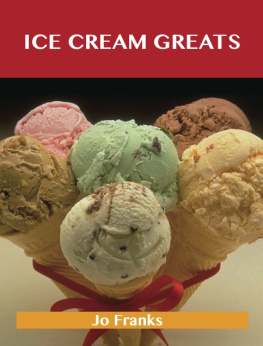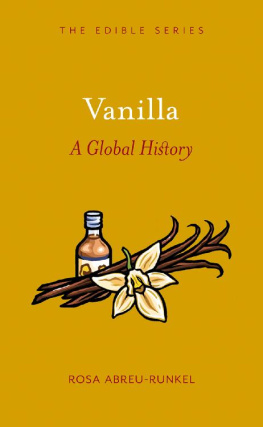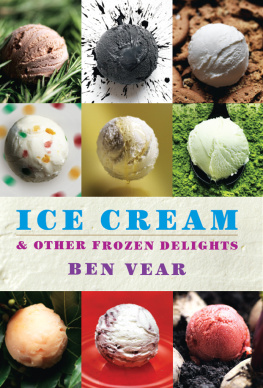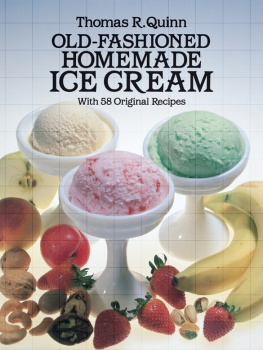Vanilla
Also by Tim Ecott
Neutral Buoyancy:
Adventures in a Liquid World
Vanilla
Travels in Search of Americas
Most Popular Flavor
Tim Ecott

Copyright 2004 by Jim Ecott
All rights reserved. No part of this book may be reproduced in any form or by any electronic or mechanical means, including information storage and retrieval systems, without permission in writing from the publisher, except by a reviewer, who may quote brief passages in a review. Any members of educational institutions wishing to photocopy part or all of the work for classroom use, or publishers who would like to obtain permission to include the work in an anthology, should send their inquiries to Grove/Atlantic, Inc., 841 Broadway, New York, NY 10003.
To be published in 2004 Austrailia by Penguin
eBook ISBN-13: 978-1-5558-4630-5
Atlantic Monthly Press
841 Broadway
New York, NY 10003
UNEDITED AND UNPROOFED COPY
NOT FOR RESALE
for Jessica
Contents
What is it like this plant, so beloved of nature that she has bestowed upon it a veritable magic wallet, in the shape of a little sheath, wherein reposes such wealth of usefulness and delight?
Joseph Burnett, 1900
The best time for impregnation is from 8 oclock in the morning to 1 or 2 in the afternoon and as far as possible the day after rain.
La Vanille, Delteil, Paris 1884
The Vanilla orchid opens in the pale light. Five celadon petals stand out around the centre of the blossom as it spreads beneath the earliest rays of the sun. Small and cream-smooth, they encircle a graceful yellow flute, the lip of the flower, which hangs outwards above the fleshy green stem of its climbing vine. Inside is the heart of the flower, filled with the makings of its own seed. There, pollen balls sticky and heavy with desire, hang above the rostellum, a thick tongue-flap of tissue separating the mass from the moist female organs below. In the wild, a bee might creep across the interior of the flower, dragging its wings and legs between the tissues and melding the ingredients of its sex. Tiny pollen grains will cling to the bee and fly with it to another flute, mixing the plants own character with that of another. But, left inviolate and unvisited, the gentle flower will bloom for five or six hours, and then wither in the tropical sun. By mid-afternoon it will be a shrivelled sack fallen to the ground.
A mans hand grasps the blossom firmly but gently, taking care not to dislodge its rich seed load. One sunbrowned finger carefully pushes the lip down and away from the pollen mass while his other hand inserts a small stick no longer than a toothpick under the rostellum, gently lifting it out of the way. With his left thumb he presses the head of the flower downwards, smearing the pollen onto the waiting stigma which sits under the flap like an aspirin under a tongue. The stick withdraws smoothly and the pale flower is fertilised. Now it will brood.
Foreword
For more than a decade I have been in love with the islands. I have revelled in their heat and light, and been maddened by their remoteness. In Europes dark winters and half-lit summers I have craved their equatorial brightness and wished myself onto their silica-glint shores.
At times my love filled me with joy, occasionally anger, and even led to bouts of bitterness. Like any good love affair it made me obsessive. Years later, I cannot stop myself returning to the islands, though now we are more like old friends than lovers.
My first visit to the south-western Indian Ocean was hard work. The BBC had sent me on what they quaintly termed a duty trip gathering interviews and material for radio programmes from the region. It was an eventful journey, a rapid immersion in the politics and culture of islands scattered from the Equator to the Tropic of Capricorn.
In Seychelles I caught Dengue fever, and in Mauritius I broke my ankle. In Madagascar I developed dysentery and by the time I reached the Comoros I also had a bout of pneumonia. It was an unusual concoction of maladies, and yet as I coughed feverishly, and limped agonisingly around the disparate capitals over a five-week period I was deeply contented.
It was an interesting time to visit the region, an area that other English-speaking journalists didnt bother with, because they considered it too peripheral to world events. Whenever I made repeated visits to the islands, colleagues would sneer slightly at the idea that I was reporting from the beach again. In fact, the Cold War had not yet ended and the political tensions within the region were as different as the topography of the island states were from one another. Here were slivers of Africa set afloat in the vastness of the Indian Ocean, and surrounded by deep waters in which the super-powers liked to hide their nuclear submarines.
Seychelles was then a one-party state, a closed and internally divided society where people lived by secrets and intrigue. In Mauritius the tourism industry was just gathering pace, and making money took precedence over the Byzantine complexities of a political system dominated by considerations of caste. Madagascar, the great island continent was in the thrall of a dictator, and there were bandits and bubonic plague on the streets of Antananarivo.
My last stop was in the Comoros, then a Federal Islamic Republic and notorious for its tally of coups dtat and mercenary-led invasions. Nineteen coups in less than a quarter of a century is still something of a record, I believe. When I arrived, the President had just been assassinated and the country was in chaos. The civil service was on strike and my passport was soon locked up in the Ministry of the Interior, awaiting an exit visa. For some days it seemed as if I would spend much longer in Moroni than planned. When the strike eventually ended I was free to return to Europe, and late one night I waited at the tiny airport for the aircraft that would take me first to Nairobi, then Marseilles and Paris to catch a final connection to London.
The 747 came down out of the evening sky like a visiting swan and trundled to within yards of where I stood on the tarmac. The scented night air hung close, wrapping everything in a mix of sea-salt and tropical flowers. I have never forgotten the moon that night, a white pearl hanging above the island, casting its shadow over the crouching bulk of the volcano called Karthala.
Ahead of me in the crowd waiting to climb the steps to the plane, there was a tall elegant Comorean woman dressed in colourful cotton robes. Her hand luggage consisted of a rattan basket wrapped inside a large plastic bag. From the holes where the handles opened the long thick tendrils of a green climbing plant seemed to be struggling to escape.
What is it? I asked.
Vanilla, she whispered, looking around to make sure no-one was watching. In my apartment in Paris I will keep it very warm, and it will remind me of home.
Vanilla. A word that fills the mouth and exercises the tip of your tongue. The word meant little to me: a taste, a flavoursomething that went into ice cream. I hadnt ever thought about the plant that might give fruit to the long dark sticks I had seen for sale in supermarkets. Vanilla pods, thats what we call them. Or are they beans?
That night the vine in the rattan basket was leaving the tropics for a captive life in Paris. The plant was returning to the very city from where its ancestor had been brought to the Indian Ocean more than a century and a half before. That first cutting had not travelled in a plastic bag on an aeroplane, but on a wooden ship to nearby Runion, from where it would eventually move to Madagascar, Mauritius, Comoros, and Seychelles. But like me, that original vine had begun its journey not in France but in London.
Next page






